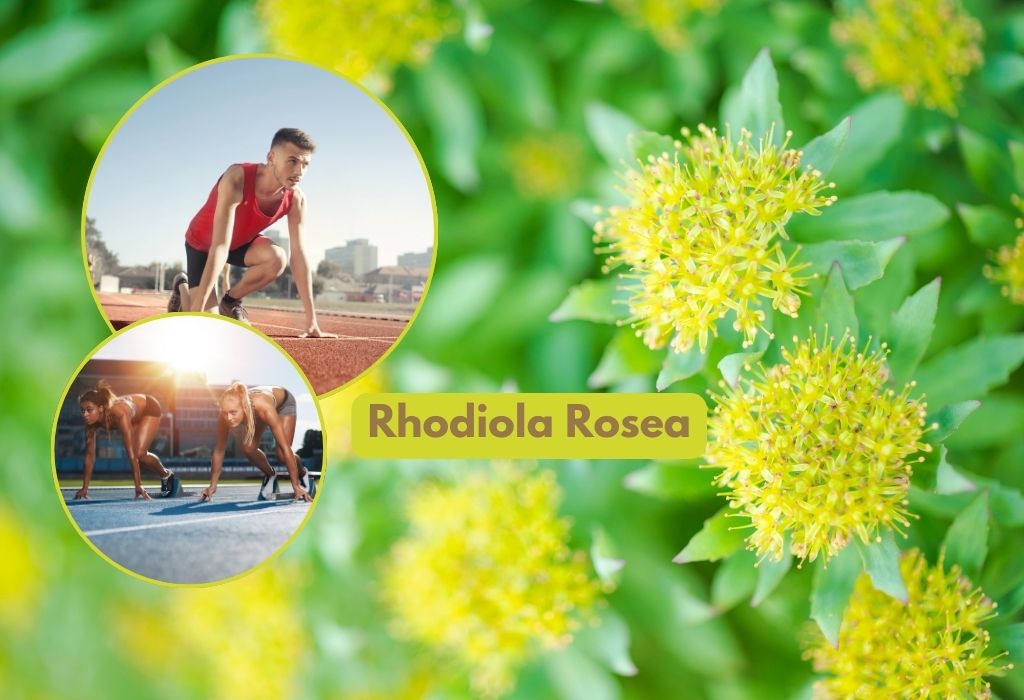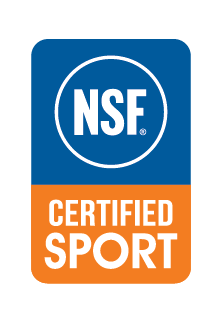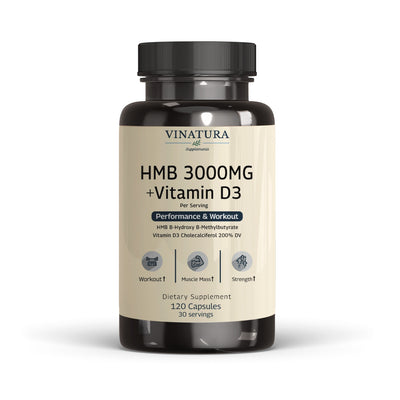
What are the Benefits of Rhodiola For Athlete's Performance?
With increasing demands for endurance and recovery, athletes seek natural methods to enhance their training performance. One such method is the use of herbal supplements, specifically Rhodiola rosea. In recent years, Rhodiola rosea has shown promising benefits for athletes' health and athletic performance. This article explores in detail the benefits of this herbal remedy.
Before exploring further, please read the disclaimer located at the end of this webpage.
Key Takeaways
- Rhodiola rosea improves endurance and cognitive function, enhances mood, and boosts immune function in athletes.
- The recommended dosage of Rhodiola is 100 mg - 200 mg per day, divided into two doses before breakfast or lunch.
- Caution is advised at high doses due to potential side effects such as increased blood pressure, dry mouth, dizziness, and heightened anxiety.
Benefits of Rhodiola For Athlete's Performance
Endurance Exercise

Rhodiola helps improve the body's endurance during exercise, enhancing resilience to temperature and harsh environments.
An initial study conducted in 2004 administered a single dose of 200mg of Rhodiola one hour before exercise for a group of athletes continuously over 4 weeks. Results showed that acute Rhodiola rosea supplementation could enhance endurance performance in healthy young volunteers [1].
Further research demonstrating the effects of supplementing Rhodiola Rosea on exercise and sports also indicates its potential to improve athletic performance and increase endurance by reducing oxidative stress, muscle soreness, and injuries, improving muscle damage and recovery during training, as well as enhancing explosiveness in sports [2].
Additionally, Rhodiola Rosea also helps improve exercise motivation in athletes. Enhancing exercise motivation can help increase endurance and minimize the impact of stress on the body.
A study on 15 older women with a dosage of 3mg/kg before a 6-mile cycling test showed that the Rhodiola group demonstrated improved endurance performance and reduced heart rate during exercise [3].
Learn more: Rhodiola Rosea for PCOS: Benefits, How to Use & Precautions
Perceived Exertion
Rhodiola Rosea enhances athletes' perceived effort by increasing endogenous opioid production. This index represents an individual's subjective perception of the physical effort being exerted during exercise or physical activity.
It reflects how intensely someone perceives themselves working during training, regardless of physiological metrics like heart rate or oxygen consumption.
Noreen and colleagues supplemented 3mg/kg to 9 subjects to assess perceived effort after Rhodiola Rosea use. They compared them with another 9 subjects using a placebo. Upon completing the trial, significant differences in perceived effort were observed between the treatment methods.
The Rhodiola Rosea group reported significantly reduced perceived exertion and mood states compared to the placebo group [4].
Blood Lactate Levels
Rhodiola Rosea can reduce Lactate concentration and muscle damage after exercise. A study in 2010 on 14 male athletes supplemented with Rhodiola Rosea long-term for 4 weeks and underwent a cardiorespiratory fatigue test yielded positive results showing Rhodiola Rosea's ability to decrease lactate, blood creatine kinase levels, and markers of muscle damage following strenuous exercise [5].
Explore more: Rhodiola Benefits for Male: Energy, Performance, and Wellbeing
Antiviral Immunity
Rhodiola Rosea is considered a panacea for enhancing immunity, energy, and mental capacity. Additionally, it effectively regulates immune function, acting as an immune stimulant, nerve stimulant, antiseptic, anti-aging, and antibacterial agent [6].
A study on 24 marathon runners supplemented with 600mg/day for 30 days before and 7 days after competition showed that Rhodiola Rosea stimulated antiviral activity by delaying exercise-induced viral proliferation and exerting antiviral effects [7].
Antioxidant Support
Supplementing Rhodiola rosea can reduce oxidative stress from muscle contractions and exert antioxidant protective roles during high-intensity exercise [8].
A study evaluating the impact of Rhodiola rosea L. extract supplementation on selective oxidative reduction parameters in 22 professional rowers with 100 mg R. rosea extract twice daily for 4 weeks showed increased antioxidant levels in serum but no effect on oxidative damage due to excessive training [10].
Cognitive and Mood Support
Rhodiola rosea may reduce anxiety and general fatigue, thereby improving cognitive function and enhancing mood, reducing discouragement among athletes.
A study on a group of 56 healthy young doctors facing fatigue during night duty tasks assessed overall mental fatigue levels related to complex cognitive functions. The results indicated no reported side effects, while Rhodiola rosea could reduce general fatigue under certain stressful conditions [11].
Improving low mood and discouragement is also a direct concern affecting athletes' training performance. Rhodiola rosea helps prevent extreme stress during overtraining in athletes.
Research shows that while R. rosea produces fewer antidepressant effects compared to other antidepressants, it also causes significantly fewer side effects and is better tolerated [12].
Ideal Dosage and Usage of Rhodiola for Athletes

The ideal dosage for using Rhodiola for athletes is typically 3 mg/kg on average, equivalent to 100 mg-200 mg per day. With a dosage of 200mg, it can be divided into two administrations before breakfast or lunch or taken all at once in the morning on an empty stomach [13].
Avoid using Rhodiola in the evening, especially after 7 PM or before bedtime, as it may affect sleep quality, disrupt sleep patterns, and increase the risk of insomnia.
When Should You Take Rhodiola for Athletes Performance: Before or After Workout?
Rhodiola supplements should be used before exercise to enhance endurance, improve mood, and increase focus. It is not recommended to use Rhodiola after exercise as it may reduce adaptation to exercise, affect performance, and not effectively exert its benefits [14].
You can use Rhodiola supplementation after exercise to expedite recovery and muscle restoration and prepare for the next training session. However, the ideal and consistent time to use it is before training.
What are the Risks and Side Effects of Rhodiola Athletes Should Be Aware?
Rhodiola Rosea is considered the safest herb for human consumption, with no reported side effects [9]. However, caution should be exercised when using high doses. Potential side effects of excessive Rhodiola Rosea intake may include increased blood pressure, dry mouth, dizziness, and heightened anxiety.
While the benefits of Rhodiola are not widely proven in the scientific community, the potential side effects it may cause are substantial and can severely impact athletes' competitive abilities. Therefore, caution is advised when supplementing Rhodiola for athletes.
Conclusion
In conclusion, Rhodiola is an herbal remedy with significant potential health benefits, especially for athletes. It can help improve athletic performance, increase endurance, and reduce recovery time. However, research on its benefits remains limited, so if you are a professional athlete, consult with experts and competition policies to ensure it does not affect performance.
Read more:
- What Are Rhodiola Sexual Benefits: Libido, ED & Sex Dysfunction?
- 15 Best Rhodiola Rosea Supplements 2024
- Can You Take Rhodiola With Coffee: How To Combine Effectively?
References
- [1] De Bock, Katrien, et al. “Acute Rhodiola Rosea Intake Can Improve Endurance Exercise Performance.” International Journal of Sport Nutrition and Exercise Metabolism, vol. 14, no. 3, June 2004, pp. 298–307, https://doi.org/10.1123/ijsnem.14.3.298.
- [2] Lu, Yao, et al. “Effects of Rhodiola Rosea Supplementation on Exercise and Sport: A Systematic Review.” Frontiers in Nutrition, vol. 9, 7 Apr. 2022, https://doi.org/10.3389/fnut.2022.856287.
- [3] Noreen, Eric, et al. “The Effects of an Acute Dose of Rhodiola Rosea on Exercise Performance and Cognitive Function.” Journal of the International Society of Sports Nutrition, vol. 6, no. S1, July 2009, https://doi.org/10.1186/1550-2783-6-s1-p14. Accessed 17 Aug. 2020.
- [4] Noreen, Eric E., et al. “The Effects of an Acute Dose of Rhodiola Rosea on Endurance Exercise Performance.” Journal of Strength and Conditioning Research, vol. 27, no. 3, 1 Mar. 2013, pp. 839–847.
- [5] Parisi, A., et al. “Effects of Chronic Rhodiola Rosea Supplementation on Sport Performance and Antioxidant Capacity in Trained Male: Preliminary Results.” The Journal of Sports Medicine and Physical Fitness, vol. 50, no. 1, 1 Mar. 2010, pp. 57–63, pubmed.ncbi.nlm.nih.gov/20308973/.
- [6] Khanna, Kunjan, et al. “Golden Root: A Wholesome Treat of Immunity.” Biomedicine & Pharmacotherapy, vol. 87, Mar. 2017, pp. 496–502, https://doi.org/10.1016/j.biopha.2016.12.132. Accessed 17 Aug. 2022.
- [7] Ahmed, Maryam, et al. “Rhodiola Rosea Exerts Antiviral Activity in Athletes Following a Competitive Marathon Race.” Frontiers in Nutrition, vol. 2, 31 July 2015, https://doi.org/10.3389/fnut.2015.00024.
- [8] Sist, Paola, et al. “Rhodiola Rosea, a Protective Antioxidant for Intense Physical Exercise: An in Vitro Study.” Journal of Functional Foods, vol. 48, 1 Sept. 2018, pp. 27–36, https://doi.org/10.1016/j.jff.2018.06.022. Accessed 30 Apr. 2023.
- [9] Bozhilova, Mariam . “Salidroside Content in “in Vitro” Propagated Rhodiola Rosea L.” Researchgate, Jan. 2008, www.researchgate.net/publication/261206583_Salidroside_content_in_in_vitro_propagated_Rhodiola_rosea_L. Accessed 23 June 2024.
- [10] Skarpanska-Stejnborn, Anna, et al. “The Influence of Supplementation with Rhodiola Rosea L. Extract on Selected Redox Parameters in Professional Rowers.” International Journal of Sport Nutrition and Exercise Metabolism, vol. 19, no. 2, Apr. 2009, pp. 186–199, https://doi.org/10.1123/ijsnem.19.2.186.
- [11] Darbinyan, V., et al. “Rhodiola Rosea in Stress Induced Fatigue--a Double Blind Cross-over Study of a Standardized Extract SHR-5 with a Repeated Low-Dose Regimen on the Mental Performance of Healthy Physicians during Night Duty”.
- [12] Mao, Jun J., et al. “Rhodiola Rosea versus Sertraline for Major Depressive Disorder: A Randomized Placebo-Controlled Trial.” Phytomedicine: International Journal of Phytotherapy and Phytopharmacology, vol. 22, no. 3, 15 Mar. 2015, pp. 394–399.
- [13] Cropley, Mark, et al. “The Effects of Rhodiola Rosea L. Extract on Anxiety, Stress, Cognition and Other Mood Symptoms.” Phytotherapy Research : PTR, vol. 29, no. 12, 2015, pp. 1934–9, www.ncbi.nlm.nih.gov/pubmed/26502953, https://doi.org/10.1002/ptr.5486.
- [14] Bentley, David J., et al. “Acute and Chronic Effects of Antioxidant Supplementation on Exercise Performance.” PubMed, CRC Press/Taylor & Francis, 2015, www.ncbi.nlm.nih.gov/books/NBK299045/.
Author

Product Disclaimer
Including an ingredient or study does not evaluate, endorse, or recommend any Vinatura product or any third-party product. Some ingredients discussed may not be used in any Vinatura product.
The content of the articles has not been evaluated by the Food and Drug Administration (FDA) and is not intended to promote or endorse any specific product. Any products sold on this website are not intended to diagnose, treat, cure, or prevent any disease.
Opinions and Endorsements
Any claims, statements, or opinions expressed in the articles are those of the author(s) and do not necessarily reflect the views or opinions of the manufacturers of the dietary supplement products. The products sold on this website are separate from the content of the articles and are not directly endorsed or associated with the information presented here.
Liability Disclaimer
The author(s) of the articles, website, and manufacturers of the dietary supplement products do not assume any liability for any potential consequences arising from the use of the information provided in the articles. Ingredient effects, dosages, and safety vary by individual, formulation, and context; some ingredients interact with medications or may be unsuitable during pregnancy or lactation. It is recommended that individuals consult with a qualified healthcare professional before making any dietary or lifestyle changes, including the use of dietary supplements.
Product Usage
Please refer to the product labels and packaging for specific usage instructions and guidelines for the dietary supplement products sold on this website.
Customer Support
For any concerns or questions regarding the dietary supplement products, please contact our customer support team, who will be more than happy to assist you.






Leave a Comment
Be the first to comment.
What do you think?